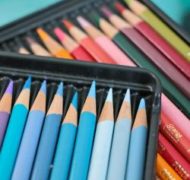Books on Culture: A Million Little Ways by Emily Freeman
Blog / Produced by The High Calling
I open up the new sketch pad, and the stark white pages taunt me. This little book is literally a blank canvas, waiting for my art, and I haven’t taken the time or had the courage to draw one thing in it in the past three weeks since I bought it.
When my husband and I found ourselves at Barnes and Noble the week after Christmas, I knew I would be taking home a new sketch pad. It’s true that I have several old sketch pads up in my closet, and they all have plenty of blank pages in them. But a new sketch pad seemed like a new commitment to create art. A commitment I thought I was ready to make. And with a $50 gift card in my purse, I had no excuse not to.
I used to call myself an artist, painting with acrylic on canvas and watercolor on paper every few days. But other responsibilities began squeezing out my art, and the time it took each session for getting out the paints, mixing the colors, waiting for the layers to dry, cleaning up brushes, etc. kept me from it on a regular basis. But the art was still in me. And keeping a sketch pad and pencils at hand—that’s easy. So I thought.
Turns out, all of art had become too serious for me. In the time I might have been drawing in my new sketchpad these past few weeks, I had been mapping out a marketing plan for my writing career, micromanaging our family calendar, and reorganizing closets and shelves to make room for creativity in my life.
Art had become something I do rather than someone I am.
“The art you and I were born to make is released out of the core of who we truly are,” Emily P. Freeman writes in chapter two of her book, A Million Little Ways: Uncover the Art You Were Made to Live. And who we truly are, Freeman assures us, are artists created by a Master Artist.
In her first two chapters, Freeman builds a case for God as artist rather than technician.
He does not manage us, to-do list us, or bullet-point us. He loves us. Is with us. And believing him feels impossible, until we do, like a miracle, like lukewarm water turning merlot red right there in the cup. And hope sprouts new, because God doesn’t give us a list. He invites us into the story.
Using the biblical language of Ephesians 2:10, Freeman shows us that the word “poiema,” translated “masterpiece” or “workmanship” in modern translations, is the same word from which we get “poem.” So when the Bible says we are God’s “poiema,” it is saying we are poems and God is the poet.
“What happens when God writes poetry?” Freeman asks. “We do. We happen. We are walking poetry, the kind that moves, the kind who has hands and feet, the kind with mind and will and emotion.” Taking it one step further, Freeman reveals that that same word, “poiema,” also is used in Romans 1 and translated, “everything God made.”
This might lead us to discount our own art or try to convince ourselves that God doesn’t need us. But God wasn’t satisfied just to make us his art; He also makes us into his artists, and from the work of our hands, He sees His own reflection.
Trees may declare God’s glory, but they do not bear his image. Jesus uncovers our remade image-bearing identity and invites us to release our glory-declaring capability. Being his workmanship doesn’t mean we are all poets. It means we are all poems, individual created works of a creative God. And this poetry comes out uniquely through us as we worship, think, love, pray, rest, work, and exist. Jesus reminds us we are art and empowers us to make art.
I sit on the couch on a Saturday afternoon wrapped up in a blanket, watching the snow gather on the branches outside our front window. As God the Artist showers down his glory on the bush, I grab my new sketch pad and the colored pencils from my red plastic pencil box. My step-sons come and go as I sit here drawing. “It’s really good,” they say, encouraging me on. I'm not so sure.
But when it is finished, or at least when I am finished, I offer my version of the snow-covered branches back to their Maker.
Art making art for the Artist.
On Monday afternoons in February, we're discussing Emily P. Freeman's A Million Little Ways. This week, we read Part One: Who is the Artist? Next week, Laura Boggess leads us in discussing Part Two: Uncover the Art You were Born to Make. I hope you’ll join us! The winners of last week's giveaway of The Geography of Memory are Kris Camealy and Stephanie. Congratulations! I'll be in touch.
Charity Singleton Craig is a content editor for The High Calling and a contributing writer for Tweetspeak Poetry. She grew up on an Indiana farm and now lives with her husband and step-sons across the street from another Hoosier corn field.
Image by Susan Etole. Used with permission. Sourced via Flickr.





